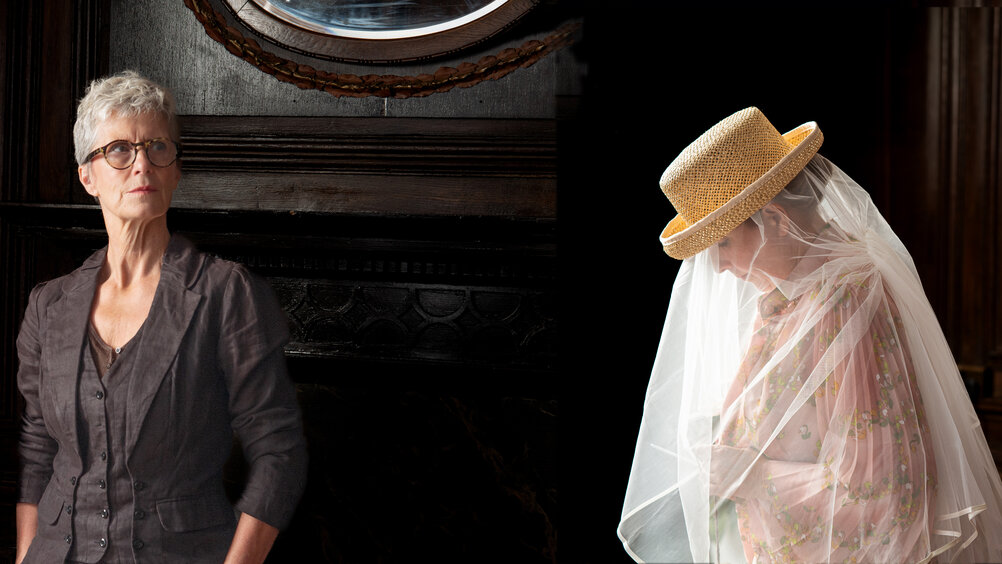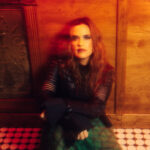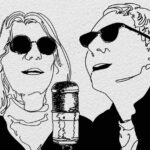
All The Bees, a musical collaboration between Kirsty McGee and Gitika Partington, defies conventions with their pastoral alt-folk sound. Emerging from a chance meeting, this duo crafted their debut album over three years of remote collaboration, navigating grief, illness, and a pandemic. The harmonies, though created through virtual means, echo a predestined connection. We explore the unique journey that birthed All The Bees and their craft.
How did you first meet and what led to the formation of All The Bees?
We met online on a US based music course on a zoom call with at least 100 other musicians. No-one was able to speak but Gitika saw Kirsty’s face in a tiny zoom window, noticed from the chat she was also from the UK and messaged her about trying to write a song together. It worked so well that we just kept going. We have created about 13 songs of which 9 are on the new album.
Your debut single, ‘Wildflowers’ draws inspiration from the Victorian tradition of ‘floriography.’ How did this tradition shape the lyrical content of the song, and what messages did you aim to convey through the symbolic language of flowers?
Well the thing about having a secret language is that it’s more fun if you don’t tell people the meanings…but to be fair I’ve always enjoyed the games that can be played with symbolism right across literature: I used floriography to convey a sense of wonder and to convey the amazing history that shapes our relationship to the natural world. I would love there to be an answering wonder in people’s approach to the songs as the secrets are all out there and a curious mind will find it easy to read their own meanings into the lyrics.
Kirsty, your song ‘Sandman’ played a significant role in the 2014 thriller Trance. How does your background in creating music for film and TV influence the storytelling aspect of All the Bees’ songs?
‘Sandman’ didn’t start out as a song that was written for film or tv – it was picked up accidentally when a mixtape was given to Danny Boyle including the song. My own experience with writing for film and tv is that no matter how appropriate you feel the writing is, it’s usually chance (or in some cases very hard work and an excellent agent or library) that will land a placement. If I learned anything on the course that led to my meeting Gitika it’s that storytelling in songs aimed for sync is not the best idea. I tend to try and write ‘hazy’ lyrics that suggest rather than show and perhaps this is the origin of that approach. I always feel it’s important to leave enough space in a song for a listener. It’s like setting up a warm fire but leaving the door open to allow the space for guests to arrive.
Gitika, with your expertise in choral acapella arrangements, how did you bring this into the collaborative process with Kirsty?
Harmony is my first love, I first sung harmony with my mum dad brother and sister. We were the Partington Family Singers and did concerts when I was very young, so I learned to harmonize very early in life. Multi layered voices is just something Kirsty’s vocal just seem to call out for and as it is my first love I was in a very happy place.
Your debut album’s themes focus on nature, including loss, death, and rebirth. How did you navigate the emotional landscapes of grief and illness to infuse these themes into the album?
We did support each other a lot through this period mostly through phone calls, messages and the old-fashioned postal service, as most of our time working together was through the pandemic. We are both very open hearted and feel things very deeply, we understood each other’s grief and gave each other gentle support and a lot of space when needed. One feel of this music is gentleness.
Despite meeting only three times in real life, the harmonies and musical flow on ‘Wildflowers’ and throughout the album suggest a deeper connection. How did this sense of connection develop through remote collaboration?
Through deep listening and musicality. We are both very experienced at what we do, and both have a sensibility about music that we very rarely crossed about. There were very few times when we even disagreed about how the music developed in the ether. We think we are very different but also think we probably have more things in common.
Can you tell me more on the collaborative process and how you achieved the delicate balance between your distinctive styles in creating this ethereal atmosphere?
Gitika would send Kirsty a ‘bare bones’ backing track on a digital audio workstation called Logic and Kirsty would devise lyric and melody to it and sometimes play and record multi-flutes. This part of the process would happen quite fast. Kirsty would send the files back to Gitika who would spend time turning it into the song you hear. Kirsty’s major skills in this project have been her poetic lyrics and haunting vocals and Gitika has been the mixer and producer, almost a musical mosaic maker, deciding what will go in what will go out, cutting pasting adding layered vocals, but not too many. It’s all about keeping the pieces spacious. Adding layered vocals, sometimes cutting the lyrics and repeating them again, changing the form. One time Kirsty just sent a voice memo of a lyric and Gitika added the rest of the track and kept the voice memo as the lead vocal. You will not be able to guess which one it is but it is one of the most powerful tracks on the album so don’t anyone ever tell you that you need to spend loads of money on a microphone!
Can you share an anecdote or memorable moment from one of your three real-life meetings that encapsulates the essence of All the Bees’ collaboration?
The first time we met we were passing things out of the oven and cooking together in Gitika’s small kitchen like we had been cooking together all our lives! We remember thinking if the music all went belly-up we could run a supper club or café together.
Your debut album has just been released. How do you hope listeners will connect with the music, especially considering the challenging times during which it was created?
We both hope that the album will allow listeners to consider a closer connection with the natural world, with a simpler time and space, with the poignancy of loss. In essence we hope we’ve created a moment of beauty forged by two strong sensitive, stubborn women who continue to furrow a path in the world despite loss, illness and setbacks.
Further information
All The Bees debut single ‘Wildflowers’ and their self-titled debut album is available now.




